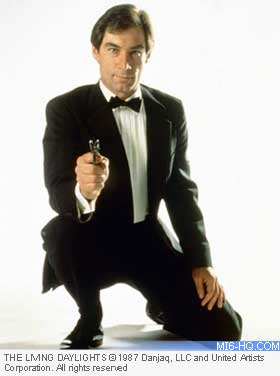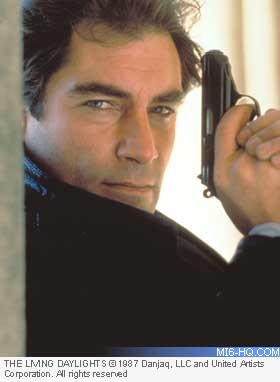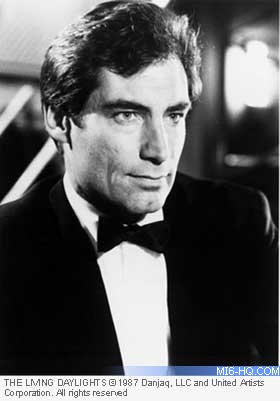|
|
|
 |
| |
On this day in 1987, Timothy Dalton made his debut
as James Bond as The Living Daylights premiered in
London. MI6 looks back at how the actor took on the
role...
|
|
The Living Daylights - 20th Anniversary
29th June 2007
On June 29th 1987, Timothy
Dalton made his big
screen debut as James Bond in "The
Living Daylights" - the fifteenth
adventure from Eon Productions.
But
it was not the first time the Welsh-born actor had been asked
to take up the mantel of the world's most famous spy.
"It is true that Cubby very kindly asked me in
the past if I'd be interested in doing it. The first time
was a long, long time ago. It was when Sean
Connery relinquished
the part. Then I had a very good career in films as a young
man and was very flattered to be asked. But, you know,
I mean, Connery was so good. I mean, Connery was terrific.
And I was, I don't know, 24 or 25. I didn't think it possible
that I could take over from him."
"So I said, 'Thank you.
Terrific, terrific thanks for the interest, but no." With
Pierce Brosnan dragged off by NBC in 1986, the offer went
in to Dalton again - and this time he accepted (Brosnan
would get his chance later in 1995).
With Roger
Moore bowing out after "A
View To A Kill",
Dalton was not only taking over as a new actor in the infamous
tuxedo, but was also charged with bringing a fresh feel
to the franchise which had completed seven consecutive
films with Moore - whose light touch had steered the series
through the 70's and early 80's and was ingrained with
a new generation of post-Connery fans. |
|

 Buy
Timothy Dalton Photos (UK) Buy
Timothy Dalton Photos (UK)
 Buy
Timothy Dalton Photos (USA) Buy
Timothy Dalton Photos (USA) |
Although an idea by Michael G. Wilson and writer
Richard Maibaum to take
Bond back to the start of his career as a double-o agent was
iced
by producer
Cubby
Broccoli (the
concept was resurrected for 2006's Casino
Royale with Daniel
Craig as
the
new 007), Dalton
and the
Bond
team planned
a more serious outing for a world which faced new challenges.
Dalton spoke candidly about his first Bond movie in a magazine
interview at the
time. "The Living Daylights was already written and was very much of the
preceding humour when I signed on. We did shape it a little bit as we went along,
trying to make it more involving and special."
To bring Bond back to the heights of his early films, Dalton
went back to the original material - what Ian
Fleming had put
down on paper all those years ago. "There's a very interesting
moment in 'Casino Royale', the very first book," he said. "It
was a book unlike the rest of the series, a book at the end of
which Bond felt that he had had enough. He was finished. He couldn't
resolve the morality of working and living in a world where one
day someone is your friend and ally, and the next day he's setting
out to kill them, just on the whim of the government; the whim
of policy.

|
|
"How do you deal with yourself morally when you're
supposed to
be on the side of right and good, when you're a killer?
When your job is to kill people? It was either in 'From
Russia
With Love' or 'Casino Royale', where he says, 'When I was
younger I used to think that I was doing something noble
and worthwhile by assassinating somebody, and now I realize
I'm a murderer. I'm just killing me, the person who works
for the other side.'
"But in Casino Royale, this malaise,
dirty morality disgusted him and he wanted to quit. It
was in that book that someone told Bond he should then
go out
after the big people; the major threats, and from then
on Fleming wrote books that were about a hero against evil.
A flawed hero. A hero ridden with weaknesses and vices,
but
also a hero of strength and conviction and you definitely
had honor and a sense of justice. But he didn't live in
a real world of politics. He wasn't a vigilante, because
he
often depends on other people." |
Although the level of violence and sadism would
be ramped up for Dalton's second outing "Licence
To Kill", his research
in to the character brought some of these elements out in "The
Living Daylights". Dalton said, "It's a theme that
runs through all the books, really. He has a thing Fleming called
acidity, which is an odd word and I don't know what it meant.
But I think it means revulsion or distaste for your work. The
man is a paradox. He's a contradiction. In the short story The
Living Daylights – rough story, isn't it? – he's
in a room with whiskey, uppers and downers in order to murder
someone he doesn’t want to murder, but has to because he's
licensed to kill. In other stories, of course, he takes a very
pragmatic course and does kill people, because he believes in
what he's doing."
The media often portrays Bond as a person that every man wants
to be, but Dalton did not agree. "I don't think he’s
a role model. He is a flawed hero, but then heroes come in all
shapes and sizes. Sometimes they're white knights in shining
armour, sometimes they're detectives like Raymond Chandler, Philip
Marlowe or Hammett. "Understand," he continued, "I
don't think Bond reflects all of that at all. We're talking about
Bond as Bond. [In my film] Bond is seen as human; a Bond who's
a real person, with more dimension than maybe he's had before.
You see, in films these days people talk about heroes and superheroes
and supermen and all that. I don't think they're heroes. Anyone
that is bound to win, anyone that's inhuman, not human, ain't
a hero. Heroes are the survivors. Heroes are the people that
have that extra tenacity and resolve to deal with what life throws
at them."
"In order for the audience to be swept along in
this fantasy, you've got to believe in the person. We want
to believe. We want to be caught in it, we want to be thrilled
and excited, and you can only feel those things if you're
involved. And I don't believe Bond is superman, a cardboard
cut out or two-dimensional. He's got to be a human being.
He’s got to be identifiable, and that’s what
I'm trying to be. In The Living Daylights where he's with
his associate, Saunders and he says, 'I don't give a f***
if M fires me. I don't like this work.' Every movie is
a different story and each film we do will present different
opportunities, and show different aspects of the character.
I want to participate in bringing the movies back to a
world that I think a James Bond movie should inhabit."
"I think this film, The Living Daylights, it's not
just an action adventure film. It's the first time we've
seen what could be called a romantic mystery film. There's
an honest and good relationship with the leading lady.
You see Bond with a lot more I think, I hope, harder edges
and also softer edges." |
|
 |
Related Articles
 The
Living Daylights - Movie Coverage The
Living Daylights - Movie Coverage
|
|
|